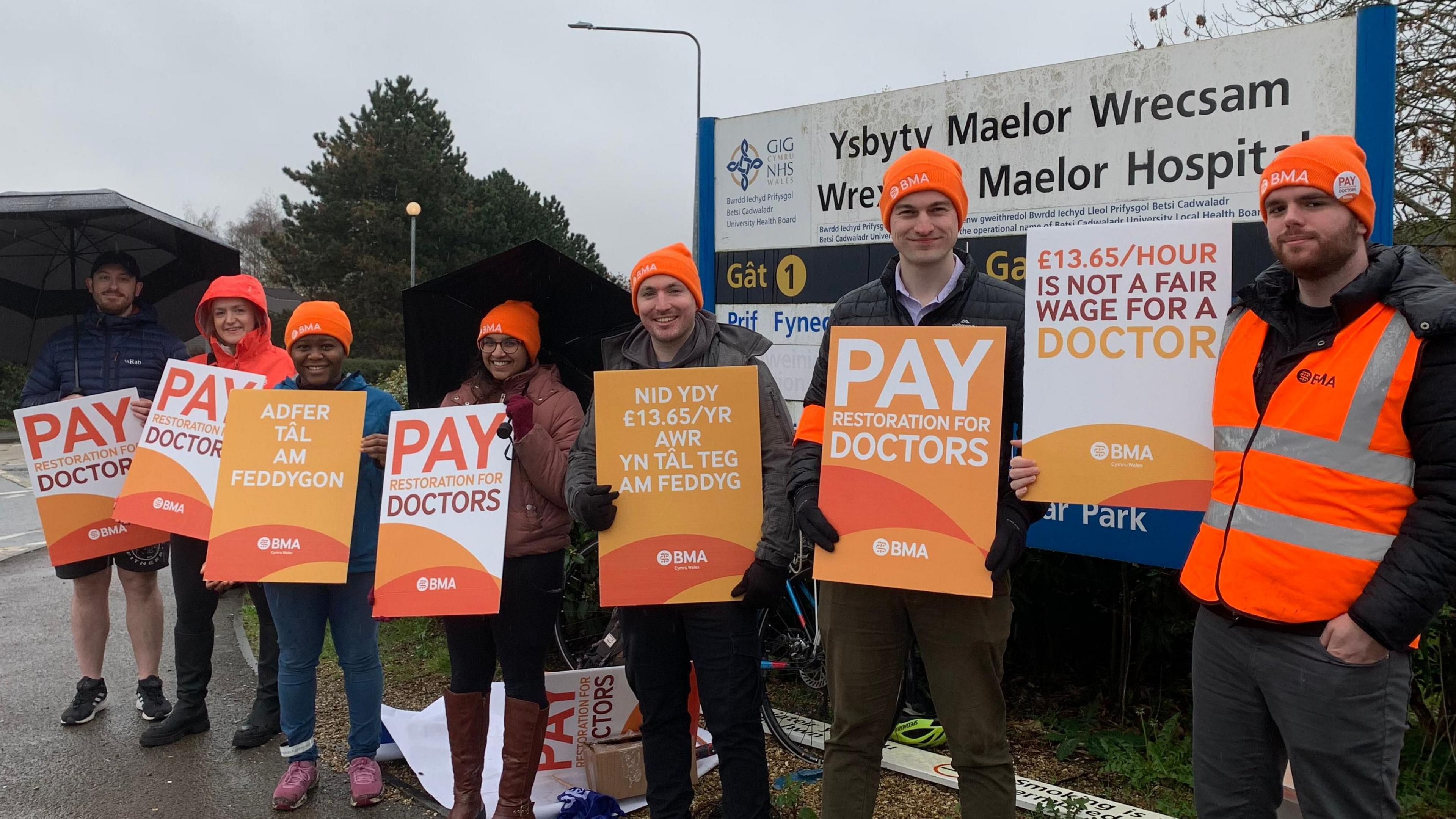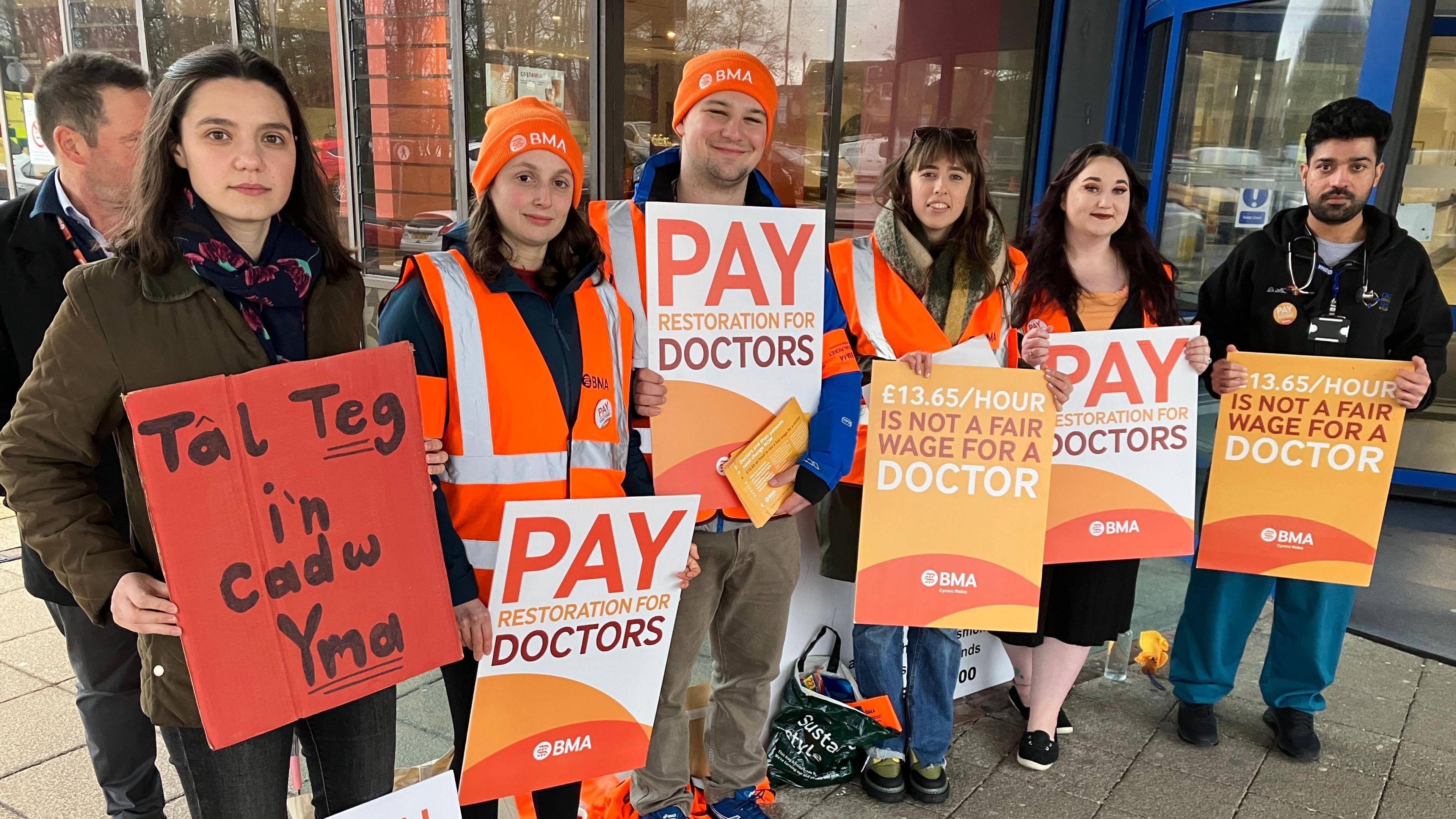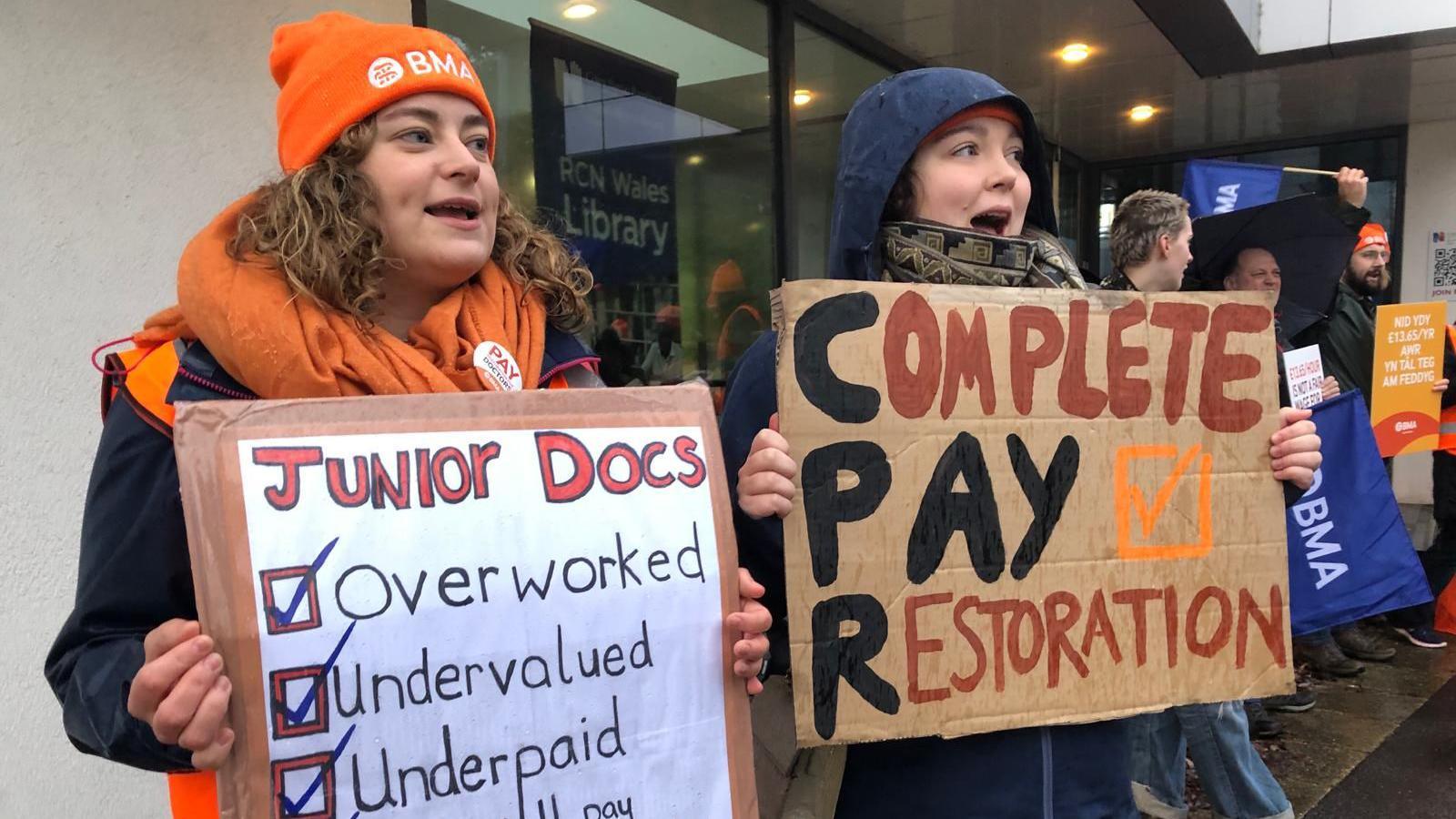Junior doctor strike costs £1m a day - NHS boss

Doctors like these in Wrexham will continue their walkout until Friday morning
- Published
A four-day strike by junior doctors will cost more than £1m a day, according to the boss of NHS Wales.
The British Medical Association (BMA) said the situation was "extremely sad" but that it had been left with no choice, as doctors' pay had dropped by almost a third in 15 years.
Health bosses warned about the “significant” impact the industrial action would have on services.
The Welsh government said it did not have the funds to improve its 5% pay offer, which junior doctors rejected.
Almost half of appointments off as doctors strike
- Published16 January 2024
Thousands of junior doctors begin 72-hour strike
- Published21 February 2024
Wales doctors' strike timing worries NHS bosses
- Published14 January 2024
Get in touch
Are you a junior doctor? Please share your experiences.
NHS Wales chief executive Judith Paget told BBC Wales: "The strike action for each day costs about £1.1m.
"So at the end of 10 days, which we've now got to - it will be nearly £11m as a one-off cost to the NHS."
More than 3,000 BMA members are expected to take part in four days of industrial action with thousands of appointments likely to be cancelled.
Industrial action started at 07:00 GMT on Monday and will last until 07:00 on Friday.
First Minister Vaughan Gething said he would meet the BMA to discuss "what we can do now and what the future might bring".
Dr Oba Babs-Osibodu and Dr Peter Fahey, co-chairs of BMA Cymru Wales’ junior doctors committee, said: “We don’t want to be in this position but again, faced with inaction, we are left with no choice.
“Junior doctors are starting their careers earning £13.65 an hour in Wales. Is that all they are worth? They are providing lifesaving care after training for years and are shouldering up to £100,000 of debt.
“It is no surprise that we are losing doctors as they search for better pay and conditions elsewhere. Losing our doctors at a time when waiting lists are at record highs will mean patients suffering more than they are already.”

Doctors joined the picket line at the Princess of Wales Hospital, Bridgend early on Monday
Following her re-appointment by the new first minister last week, Health Secretary Eluned Morgan said: “While we wish to address pay restoration ambitions, our offer is at the limits of the finances available to us at present and reflects the position reached with the other health unions for this year.”
The 96-hour walk-out will be the third time junior doctors in Wales have taken industrial action this year.
During the previous three-day walk-out in February, 9,102 outpatient appointments (30% of all appointments) and 1,090 operations (32% of all operations) had to be postponed.
Urgent and emergency care will continue to be provided for those in need during the period of industrial action.
“We ask people to use alternatives to emergency departments if their need is not critical during the strike period. Alternatives include NHS 111 online or by phone, and pharmacies," said Ms Paget.
“If your appointment is not going ahead, your health board will contact you to let you know. If you aren’t contacted, please attend your appointment as planned."
She added it could also take longer for GP and pharmacy services to process prescriptions.

The British Medical Association in Wales says it is "extremely sad" and "frustrating" to go on strike again
A UK-wide study by Ipsos Mori in January found almost half (48%) of people supported the junior doctors' strike. A third of respondents (33%) were against industrial action and 17% were indifferent.
At a fitness class in Caerphilly borough, there were a mixture of views on the latest walk-out in Wales.
Mandy Evans, 61, said: "My daughter-in-law is a doctor and some of the things she's told me that she's experienced where they're left with very little supervision on weekends or in the night time or they're left overseeing three or four wards at a time. I just think the money is not enough."
Karen Clarke, 58, said her mother's hospital appointment was cancelled due to the junior doctors' strike in January: "My mother stresses enough about appointments so when it's cancelled it just impacts [her] even more - mental health, everything. So, no, I'm not in agreement with it, unfortunately."
Consultant and specialist doctors will also go on strike in Wales next month after they voted in favour of industrial action due to a pay dispute.
They will walk out over workplace conditions caused by extreme pressures and unsafe staffing levels, according to the BMA.
The Welsh government said it would continue to press the UK government for the necessary funding to ensure “full and fair pay rises for public sector workers".
The UK government said: “The Welsh government is well funded to deliver on its devolved responsibilities - including health – as we are providing it with a record £18bn per year settlement, the highest since devolution.
“It must ultimately answer to the Senedd and the people of Wales on how it chooses to fund services.”
This latest strike by junior doctors is a ramping up of their industrial action.
Lasting 96 hours or four full days, it's longer than the previous two strikes. But there will be an even bigger knock-on impact because those four days are immediately before the Easter weekend which includes two bank holidays.
All of that means the NHS will be operating at much reduced capacity for more than a week. So a huge amount of planned operations and appointments won't now be happening and will need to be rescheduled.
Not only will that be an inconvenience to many patients but it could also cause distress for individuals who may have been waiting a long time already. And with the size of NHS waiting lists, in general, still stubbornly high this won't help bring them down.
But health boards will try, as much as they can, to protect emergency care.
Consultants and other senior doctors will be drafted in to cover some of the work of their junior colleagues. But paying them a premium to do that is likely to be an extra cost for already cash-strapped health boards.
It's no wonder then that the NHS Confederation in Wales, which speaks on their behalf, is urging Health Secretary Eluned Morgan to make resolving the dispute a top priority.